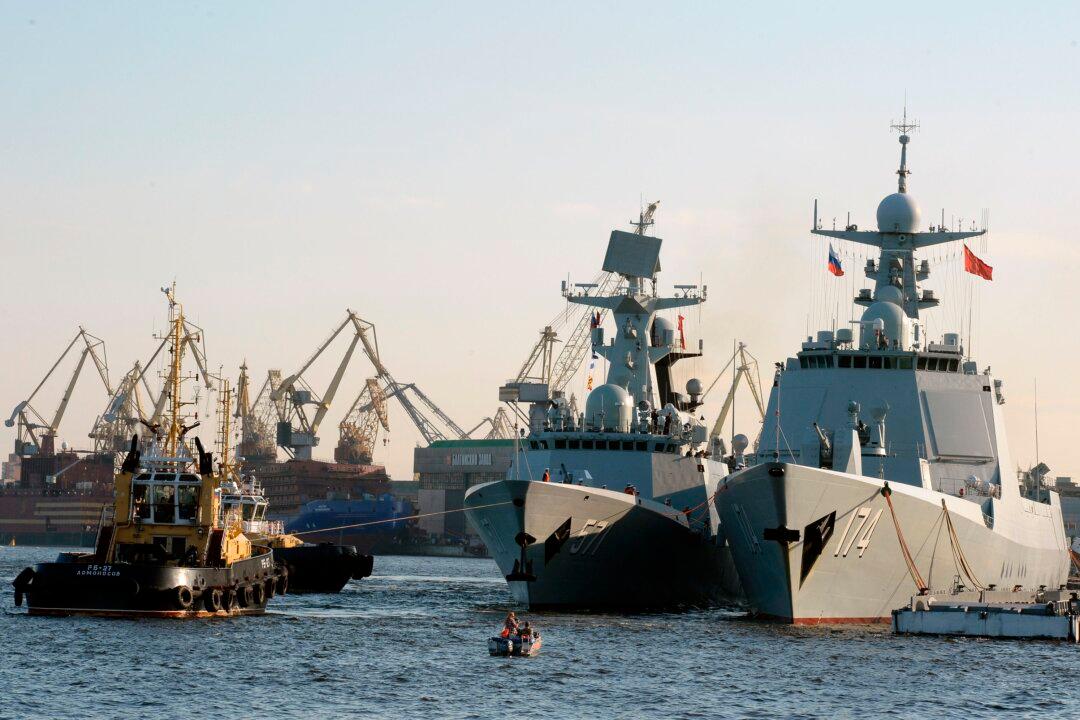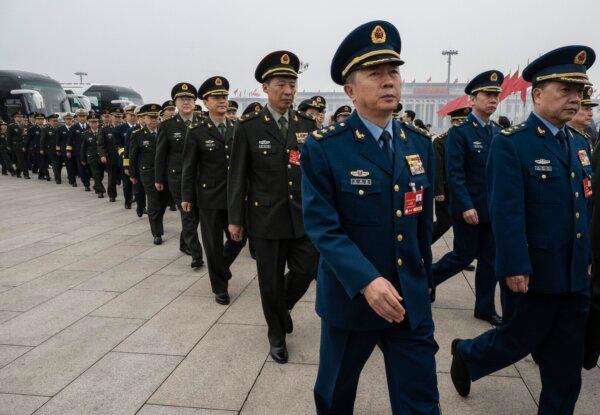A UK security think tank analyzed leaked Russian documents.

Chinese Type 052D missile destroyer Hefei (R) and Chinese Type 054A frigate Yuncheng dock in Saint Petersburg, Russia, on July 27, 2017. Olga Maltseva/AFP via Getty Images
A trove of leaked Russian documents analyzed by a London-based defense institute suggests Moscow is supplying Beijing with equipment, technology, and training that could bolster the Chinese regime’s ability to mount airborne operations—capabilities analysts say could be applied to an attack on Taiwan.
The Royal United Services Institute’s (RUSI’s) analysis is based on approximately 800 pages of contracts, equipment lists, and correspondence obtained from the Black Moon hacktivist group. The materials, which date from 2023 to late 2024, according to the report’s authors, describe plans to transfer a complete set of weapons and systems to equip an airborne battalion, as well as specialized parachute systems and a training program for operators and technicians in Russia and China.
RUSI authors have vetted some of the files, but they caution that documents may have been edited or parts omitted.
The Epoch Times could not independently verify the veracity of the documents or the claims made by the RUSI authors.
Among the items listed are 37 BMD-4M light amphibious assault vehicles, 11 Sprut‑SDM1 light amphibious anti‑tank guns, 11 BTR‑MDM airborne armored personnel carriers, and multiple command-and-observation platforms. The agreements require the vehicles to be equipped with Chinese communication suites and adapted to use Chinese ammunition, and provide for the establishment of a technical maintenance center in China, complete with full documentation for local production and modernization.
The files also discuss high-altitude parachute systems known as “Dalnolyot,” which, according to RUSI, are designed to deliver loads of up to approximately 419 pounds (190 kilograms) from high altitudes and permit long gliding distances. These capabilities could enable the covert insertion of special forces and equipment far inland.
According to leaked documents shared exclusively with The Associated Press, meetings were held in Moscow where Chinese interlocutors requested testing the parachute systems under very low temperatures and parachute drops from approximately 26,250 feet (8,000 meters).
RUSI authors told AP that China’s airborne landing capabilities are still in the early stages, and that Moscow’s assistance could accelerate the country’s airborne program by 10 to 15 years.
Russian instructors are also tasked with training Chinese paratroopers and equipment crews in both Russia and China, according to the analysis.
Despite Russia’s failure to conduct a successful airborne seizure of Hostomel Airport in Ukraine in 2022, RUSI analysts suggest that China is intent on learning from Moscow’s combat experience and integrating those lessons into its own force modernization efforts.
China’s communist regime considers Taiwan a part of its territory even though it has never governed the island and has never ruled out the use of force to seize it. In recent years, the regime has ramped up diplomatic, political, and military pressure on the island. U.S. officials have warned of a possible timeline of China attacking Taiwan by 2027.
Chinese leader Xi Jinping has ordered the People’s Liberation Army (PLA) to be prepared to seize Taiwan by 2027, the analysis notes. Although the leaked files did not mention Taiwan by name, the RUSI analysis suggests that the described capabilities would be relevant to an airborne campaign against the island. For example, armored vehicles could be air-dropped onto open, firm ground, such as golf courses near ports or airfields, to create footholds for follow-on forces, it said.

Delegates from the Chinese military seen before the closing session of China’s rubber-stamp legislature, the National People’s Congress, at the Great Hall of the People in Beijing on March 11, 2025. Kevin Frayer/Getty Images
Analysts who reviewed the files say that Moscow stands to gain: arms sales would generate revenue for a defense industry strained by the war in Ukraine, and closer China–Russia military-industrial ties could increase Moscow’s leverage with Beijing.
Potential Application in Taiwan
Cheng Kaili, a Taiwanese national and former businessman, said that after founding a medical device company in Beijing in 2001, he gained deep insight into the Chinese Communist Party’s (CCP) infiltration and espionage activities targeting Taiwan.
In a recent interview with the Chinese-language edition of The Epoch Times, Cheng said that, more than 20 years ago, he had accompanied a pro-Beijing Taiwanese official on what he now believes was a reconnaissance trip linked to potential military planning.
At the time—before launching his business in China—Cheng was a member of the central committee of the New Party, a political group that opposes Taiwanese independence and advocates for the unification of the island with China. Cheng recalled a day when he received an unexpected call from a senior party figure—a now-deceased heavyweight who had served as both a legislator and a National Assembly delegate—asking him to drive south along Taiwan’s western coast.
The journey ended at a desolate stretch of shoreline in Yunlin County. Without offering an explanation, the official stepped out of the car and discreetly began taking photos of the beach.
“At the time, I thought it was odd,” Cheng said. “Why take pictures of an empty beach?”
Years later, he said, the purpose became clear to him. “That area would be ideal for an airborne landing,“ he stated. ”If Beijing were to attack Taiwan, those photos might have been part of the planning.”
Cheng said his experience conducting business in China ultimately changed his perspective. Disillusioned by the CCP’s tactics, he gradually distanced himself from his earlier pro-unification stance. He now serves as secretary-general of the Revive-ROC Freedom Party, a Taiwan-based political organization that advocates overthrowing the CCP and restoring the former Republic of China government.
Olivia Li is a contributor to The Epoch Times with a focus on China-related topics since 2012.
